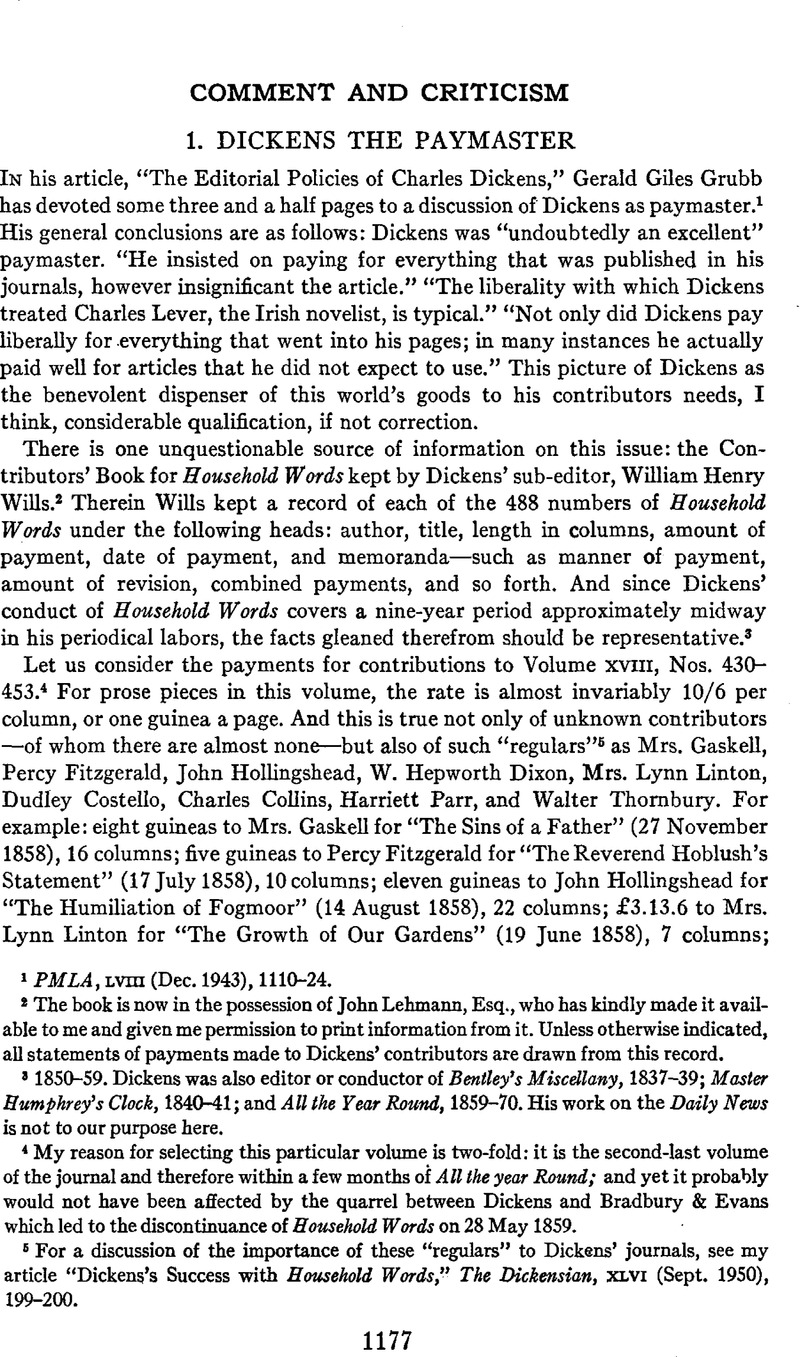No CrossRef data available.
Article contents
Dickens the Paymaster
Published online by Cambridge University Press: 02 December 2020
Abstract

Information
- Type
- Comment and Criticism
- Information
- Copyright
- Copyright © Modern Language Association of America, 1951
References
Note 1 in page 1177 PMLA, Lviii (Dec. 1943), 1110–24.
Note 2 in page 1177 The book is now in the possession of John Lehmann, Esq., who has kindly made it available to me and given me permission to print information from it. Unless otherwise indicated, all statements of payments made to Dickens' contributors are drawn from this record.
Note 3 in page 1177 1850–59. Dickens was also editor or conductor of Bentley's Miscellany, 1837–39; Master Humphrey's Clock, 1840–41; and All the Year Round, 1859–70. His work on the Daily News is not to our purpose here.
Note 4 in page 1177 My reason for selecting this particular volume is two-fold: it is the second-last volume of the journal and therefore within a few months of All the year Round; and yet it probably would not have been affected by the quarrel between Dickens and Bradbury & Evans which led to the discontinuance of Household Words on 28 May 1859.
Note 5 in page 1177 For a discussion of the importance of these “regulars” to Dickens' journals, see my article “Dickens's Success with Household Words,” The Dickensian, XLVI (Sept. 1950), 199–200.
Note 6 in page 1178 I would not suggest that she was necessarily paid at this specific rate. More probably the length of the story was considered, and she was offered 100 for the whole. The result as we see it, however, is much the same. On 20 Deecmber 1859 Dickens offered Mrs. Gaskell 200 guineas for a story to run for about five months as a weekly serial in All the Year Round (Nonesuch Letters, iii, 139–140). She did not take up the offer.
Note 7 in page 1178 The slight amount in Sala's favor here comes rather from occasional generous estimates of the length of his articles, e.g., calling eight and a half columns nine. Frequently, however, the opposite is true.
Note 8 in page 1178 The profits realized by Dickens from both Household Words and All the Year Round were greatly affected by the Christmas Numbers, for which Dickens used the best materials and took the very greatest pains. See my article (cited in ii. 5), p. 202.
Note 9 in page 1179 See, e.g., R. C. Lehmann, ed. Charles Dickens as Editor (London, 1912), p. 19.
Note 10 in page 1179 This whole question of rights and copyrights is a complex one, and a study of novel contracts during the Victorian period would be very useful indeed.
Note 11 in page 1179 Wills' letter stated the proposition to Reade as follows: “Eight hundred pounds (800) for a story to occupy not less than 160 [pages] of All the Year Round. Any greater quantity of matter that you might find indispensible [sic] to your art, still to be included in that payment.” See Franklin P. Rolfe's “Additions to the Nonesuch Edition of Dickens' Letters,” BLQ, v (Oct. 1941), 133, ii. 27.
Note 12 in page 1179 I have drawn the information on the payments to contributors to Once a Week given in this article from ledgers in the possession of Bradbury, Agnew & Co.; Alan G. Agnew, Esq., the Managing Director, has kindly made the material available to me and has given me permission to print it. Once a Week was an illustrated miscellany, and I have taken this fact into consideration in my estimates of the length of articles. It should be noted that in the case both of Reade and of Miss Braddon payment was for serial rights only; book rights were retained bv the authors.
Note 13 in page 1180 Once a Week had been begun by Bradbury & Evans to rival Dickens' All the Year Round. Both of these journals had common origins in Household Words.
Note 14 in page 1180 See, e.g., Royal A. Gettmann, “The Serialization of Reade's Good Fight',” Nineteenth-Century Fiction, vi (June 1951), 22.
Note 15 in page 1180 Lehmann (see ii. 9), p. 35. The tenuousness of the evidence on which it has been claimed that Dickens paid for “everything that was published in his journals” would seem to justify one further detail: in several instances materials of a column or less submitted by correspondents were published and entered in the Contributors' Book without any record of payment.

